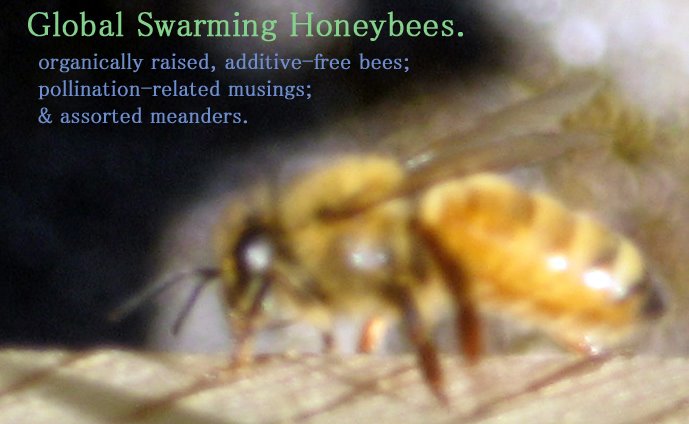Mounting evidence that pesticides are implicated in Colony Collapse Disorder certainly hasn't moved the EPA to action (not that EPA is doing much of anything these days). Under Bush&Co., the EPA has transmuted from Environmental Protection Agency to Enabling Polluters...Again (or might that be Entirely Pathetic Always? I'm sure there's no end to the unflattering acronyms we can apply in this instance; feel free to post a comment suggesting your own).
Fortunately for the bees, us, and the tattered remains of our ecosystem, the Natural Resources Defense Council (of which I am a proud card-carryin' member) is on the case and today issued the following press release announcing its new lawsuit against the EPA:
EPA Buzz Kill: Is the Agency Hiding Colony Collapse Disorder Information? NRDC Forced to Sue to Get Public Records on Bee MysteryWASHINGTON, DC (August 18, 2008) – The Natural Resources Defense Council filed a lawsuit today to uncover critical information that the US government is withholding about the risks posed by pesticides to honey bees. NRDC legal experts and a leading bee researcher are convinced that the US Environmental Protection Agency (EPA) has evidence of connections between pesticides and the mysterious honey bee die-offs reported across the country. The phenomenon has come to be called “colony collapse disorder,” or CCD, and it is already proving to have disastrous consequences for American agriculture and the $15 billion worth of crops pollinated by bees every year.EPA has failed to respond to NRDC’s Freedom of Information Act request for agency records concerning the toxicity of pesticides to bees, forcing the legal action.“Recently approved pesticides have been implicated in massive bee die-offs and are the focus of increasing scientific scrutiny,” said NRDC Senior Attorney Aaron Colangelo. “EPA should be evaluating the risks to bees before approving new pesticides, but now refuses to tell the public what it knows. Pesticide restrictions might be at the heart of the solution to this growing crisis, so why hide the information they should be using to make those decisions?”







2 comments:
You can take action on the NRDC website: http://www.nrdc.org/action/
This is the best efforts I have seen from an organization going against the big boys concerning the honeybee/pesticide issue.
Our voices (and emails) are important on this one!
Karen
If CCD or future bee pandemics became severe enough to dieoff most colonies, it might make sense now to establish a "strategic bee researve". If mites and/or fungi that cause bee epidemics die too when the bee population declines, it would be useful to have populations of honey bees segregated from the rest of the presumably infected globalized bee breeding market.
Say, breed some bees on an island. Pay to have them maintained. In the event CCD beecomes devastating enough to wipe out colonies in entire areas, the strategic bee colonies could be enlisted to repopulate canola and greenhouse food cropland. To avoid infecting the strategic bees, the dieoff would have to bee 100% and the mites/fungi can't survive on some other host that might reinfect the new bee population.
I'd suggest governments subsidize bee breeders for this purpose. It is cheaper than regulating bee trade or doing nothing and hoping for the best. I'm not sure the range of bees, but the strategic colonies would have to be outside existing bee populations.
Along with this, it would be prudent to support best practises apiculture education, meetings and consultations and such, with the goal being to educate commercial beekeepers how to multiply bee colonies ASAP in the event of a massive worldwide dieoff. The strategic reserve should be bred to be capable of rapidly multiplying, if that is possible. ie) can bees colonies be bred to take advantage of more than two growing seasons? Perhaps the strategic colonies would need to be moved many times per year to take advantage of nature nectar food supplies, or perhaps artifical nectar stores could be establish to multiply strategic colonies.
Post a Comment